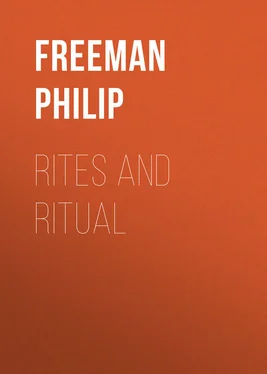Philip Freeman - Rites and Ritual
Здесь есть возможность читать онлайн «Philip Freeman - Rites and Ritual» — ознакомительный отрывок электронной книги совершенно бесплатно, а после прочтения отрывка купить полную версию. В некоторых случаях можно слушать аудио, скачать через торрент в формате fb2 и присутствует краткое содержание. Жанр: foreign_antique, foreign_prose, на английском языке. Описание произведения, (предисловие) а так же отзывы посетителей доступны на портале библиотеки ЛибКат.
- Название:Rites and Ritual
- Автор:
- Жанр:
- Год:неизвестен
- ISBN:нет данных
- Рейтинг книги:4 / 5. Голосов: 1
-
Избранное:Добавить в избранное
- Отзывы:
-
Ваша оценка:
- 80
- 1
- 2
- 3
- 4
- 5
Rites and Ritual: краткое содержание, описание и аннотация
Предлагаем к чтению аннотацию, описание, краткое содержание или предисловие (зависит от того, что написал сам автор книги «Rites and Ritual»). Если вы не нашли необходимую информацию о книге — напишите в комментариях, мы постараемся отыскать её.
Rites and Ritual — читать онлайн ознакомительный отрывок
Ниже представлен текст книги, разбитый по страницам. Система сохранения места последней прочитанной страницы, позволяет с удобством читать онлайн бесплатно книгу «Rites and Ritual», без необходимости каждый раз заново искать на чём Вы остановились. Поставьте закладку, и сможете в любой момент перейти на страницу, на которой закончили чтение.
Интервал:
Закладка:
It was in her gallant and noble protest, single-handed, against this vast and desolating perversion of the Ordinance of Christ, that the English Church, far from her own desire, and only borne down by the accumulated abuse of ages, lapsed into that unhappy desuetude of the Weekly Celebration, which prevails so widely to this hour. In her First Revised Communion Office she provided that, in order "that the receiving of the Sacrament may be most agreeable to the Institution thereof, and to the usage of the Primitive Church , some one, at the least, of that house in every parish, to whom it appertaineth to offer [at the Offertory] for the charges of the Communion, or some other whom they shall provide, shall receive the Communion with the Priest." 11 11 Rubric at the end of the Communion Service, 1549.
It is added, that "on week-days he shall forbear to celebrate except he have some that will communicate with him ." Another rubric provided, that "on Wednesdays and Fridays" (which had traditionally 12 12 Thus, in the Sarum Use, separate Epistles and Gospels are provided for those days throughout Advent, Epiphany, and Easter, till Whitsuntide; for Wednesdays only throughout the Trinity period.
been the great week-days for celebration in this country), "though there might be none to communicate with the priest, yet on those days" (after the Litany ended) "he should put on a plain albe or surplice, with a cope, and say all things at the altar appointed to be said at the celebration, until after the Offertory." And this rule was extended to "all other days," meaning apparently customary high holydays, occurring in the week, "whensoever the people were customably assembled to pray in the church, and none disposed to communicate with the priest."
Thus was a solemn protest made, and not in word only, as in other parts of the Church, but by outward deed, against the unpardonable and fatal neglect of the people to avail themselves of the ordinance of Christ. On Sundays only (so the rubric seems to mean) a peculiar provision was made, so that there should, without fail, be attendants at the celebration. But on week-days, on which there was no such Divine obligation to celebrate, the Church would carry her protest still further. While vesting her ministers, as if ready, for their parts, for the rite, she would refuse to volunteer a mode of celebration, for which there was no precedent in the early and pure days of Christianity.
Such appears to have been the intention of the First Book of Edward VI. The expedient of performing the Communion Service up to a certain point only, on Wednesdays and Fridays, was manifestly adopted from the ancient Church of Alexandria, where, as Socrates has recorded, exactly this usage prevailed on those days. In the Second Book of Edward VI. (revised, be it remembered, in part by members of the same Committee of Divines as the First was, and professing the same doctrine), 13 13 See 'Principles of Divine Service,' Introd. to Part II., p. 123-129. Mr. Perry ('Declaration on Kneeling') arrives at the same conclusion.
the provision for the compulsory attendance of each household in turn was laid aside, probably as being found impracticable. And now at length the step was taken, to which sound principles of action had in reality pointed all along; and it was ordained that, if the people, appealed to as they had been, and would continue still to be, persisted on any given Sunday in excommunicating themselves, they should even be permitted to do so. The great unreality of a Communion, which was no Communion according to the Ordinance of Christ, should be done away. The minister should still be ready on all Sundays and holydays at the altar; but it would be left, awfully left, for the people to say whether Christ's ordinance should have place, or whether its continuity should be violated, and its benefits so far forfeited.
And who will deny that such a course was, though a choice of evils, the right one? What had the other practice done, but lull the Church of God into a fatal satisfaction with a state of things as widely different from primitive Eucharist and primitive Christianity, as any one thing can well be from another? And if those other sad results have followed, which we behold before our eyes, let not the blame be laid on the age which has inherited, but on the ages which had accumulated and transmitted, such an inveterate habit of neglect to receive the Holy Communion. Be it remembered, too, that (as has been well pointed out of late) the period of the Great Rebellion caused an entire suspension of the Church's proper rites. "The Sacrament was laid aside, in those distracting times, in many parishes in the kingdom, for near twenty years." (Bishop Patrick.) "This solemn part of religion was almost quite forgotten; the Remembrance of Christ's Death was soon lost among Christians." (Archbishop Tillotson.) "The Sacrament was laid aside, in Cromwell's days, in most parishes in the nation. In many churches there was no speaking of the Sacrament for fifteen or sixteen years; till it was feared the Lord's Supper would come to be ranked among those superstitious ceremonies that must be abolished." (Dr. Durell.) These testimonies considered, the real wonder would be if there had not been found very great difficulty in bringing back, at the time of the Restoration, the primitive habit of Weekly Celebration. And now that we have added two hundred years more of neglect, we have to face the mighty difficulty of awakening a whole nation, of clergy and laity alike, to a due sense of our very grievous departure from that Apostolic model, to which professedly we appeal as our standard of duty.
And the task would seem to be hopeless, were it not, 1st, that a great and powerful movement tending to this result has already for many years been going forward; and, 2nd, that there is reason for believing that vast numbers of the clergy are really anxious to restore the primitive practice, and are only held back by difficulties, either real or imagined. Of this latter fact it is in my power to speak with some confidence; since I have been frequently urged, by no inconsiderable number of my brethren, to set forth, as I have now very imperfectly endeavoured to do, the grounds for such a restoration.
What then, supposing the clergy to be really anxious for it, are the difficulties in the way? The first and most obvious is that of finding a sufficient number of Communicants. This is to be overcome in a great measure by careful heed to that pregnant charge given to the clergy at their Ordination, "So to sanctify the lives of them and theirs , and to fashion them after the Rule and Doctrine of Christ
Конец ознакомительного фрагмента.
Текст предоставлен ООО «ЛитРес».
Прочитайте эту книгу целиком, купив полную легальную версию на ЛитРес.
Безопасно оплатить книгу можно банковской картой Visa, MasterCard, Maestro, со счета мобильного телефона, с платежного терминала, в салоне МТС или Связной, через PayPal, WebMoney, Яндекс.Деньги, QIWI Кошелек, бонусными картами или другим удобным Вам способом.
1
Can. 21. It is referred to by Hosius at the Council of Sardica, A.D. 347.
2
See Mabillon, referred to in Introduction to vol. ii. of 'The Principles of Divine Service.' – P. 79, note z .
Читать дальшеИнтервал:
Закладка:
Похожие книги на «Rites and Ritual»
Представляем Вашему вниманию похожие книги на «Rites and Ritual» списком для выбора. Мы отобрали схожую по названию и смыслу литературу в надежде предоставить читателям больше вариантов отыскать новые, интересные, ещё непрочитанные произведения.
Обсуждение, отзывы о книге «Rites and Ritual» и просто собственные мнения читателей. Оставьте ваши комментарии, напишите, что Вы думаете о произведении, его смысле или главных героях. Укажите что конкретно понравилось, а что нет, и почему Вы так считаете.












